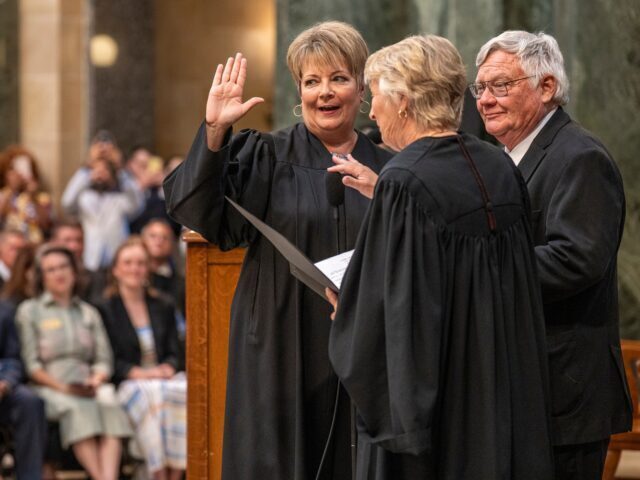Justice Janet Protasiewicz railed against a legislative redistricting plan when running for Wisconsin Supreme Court and will now rule on the legality of that plan, which dissenting justices decry as “partisan and political,” and “likely approaches 100 percent” that her deciding this appeal violates the Constitution’s Due Process Clause.
Democrats succeeded in electing Protasiewicz, who is a hardline partisan Democrat, to Wisconsin’s highest court on Apr. 4, 2023. She was sworn in on August 1. Previously the court had three staunch conservatives, three staunch liberals, and one Republican who frequently votes with the conservative bloc but occasionally votes with the Left. Protasiewicz replaced one of the conservatives.
The Republican-controlled legislature redrew legislative districts for the Badger State following the most recent census, and Democrats predictably sued. When running for the supreme court, Protasiewicz condemned the plan as a partisan gerrymander. After Protasiewicz joined the bench, the court voted 4-3 to hear the case.
On the issue of legislative districting, swing-vote Justice Brian Hagedorn was expected to vote with conservatives, so if Protasiewicz sits on the case, it is considered a foregone conclusion that she will be the deciding vote to strike it down, ordering a map that would be more favorable to Democrats in the 2024 elections.
During her campaign, Protasiewicz referred to the proposed map as “unfair” and “rigged,” saying, “I don’t think you could sell any reasonable person that the maps are fair.” She added that she “would enjoy taking a fresh look at the gerrymandering question” and said that from a previous case ruling on the issue, the “dissent is what I will tell you I agree with.”
Protasiewicz announced her decision not to recuse in a 64-page order, admitting that the case “engendered strong feelings,” but saying that she had searched both the law and her “conscience,” concluding that she should hear the case.
Chief Justice Annette Ziegler dissented, saying that the liberal bloc’s deciding to hear the case “appears to be evidence of a partisan and political, rather than a reasoned and restrained, approach, and thus departs from the constitutional role of the judiciary.”
Justice Rebecca Bradley also dissented separately, specifically objecting to Protasiewicz’s participating in the case. She wrote that the “probability of actual bias on Protasiewicz’s part likely approaches 100 percent.”
That point is critical, because the Due Process Clause of the Constitution’s Fourteenth Amendment provides that a state shall not “deprive any person of life, liberty, or property, without due process of law.”
The U.S. Supreme Court held in its 2009 case Caperton v. A.T. Massey Coal Co. that it violates due process for a judge to hear a case when it appears the judge is biased. Caperton could not be more relevant here, because it specifically involved a state supreme court justice hearing a case where one of the litigants had contributed $3 million supporting the candidate, that time in West Virginia.
Here, the amount of money the case participant – which this time is the Wisconsin Democratic Party – had put into Protasiewicz’s campaign was $10 million, making it the most expensive state supreme court campaign in American history. That amount of money is three times more than the campaign money at issue in Caperton.
Also here, the candidate has made unmistakably clear where she comes down on the precise issue in the case – the 2024 legislative redistricting map. Caperton held that giving a judicial candidate enormous sums of money creates a “probability of actual bias.” Bradley in this Wisconsin case asserts that announcing your position on a matter increases those odds close to ‘100 percent,’ positing that is certainly crosses the constitutional line.
Once the Wisconsin Supreme Court renders its decision, the U.S. Supreme Court will have jurisdiction to review any due process violations.
The case is Clarke v. Wisconsin Election Commission in the Wisconsin Supreme Court.
Breitbart News senior legal contributor Ken Klukowski is a lawyer who served in the White House and Justice Department.

COMMENTS
Please let us know if you're having issues with commenting.